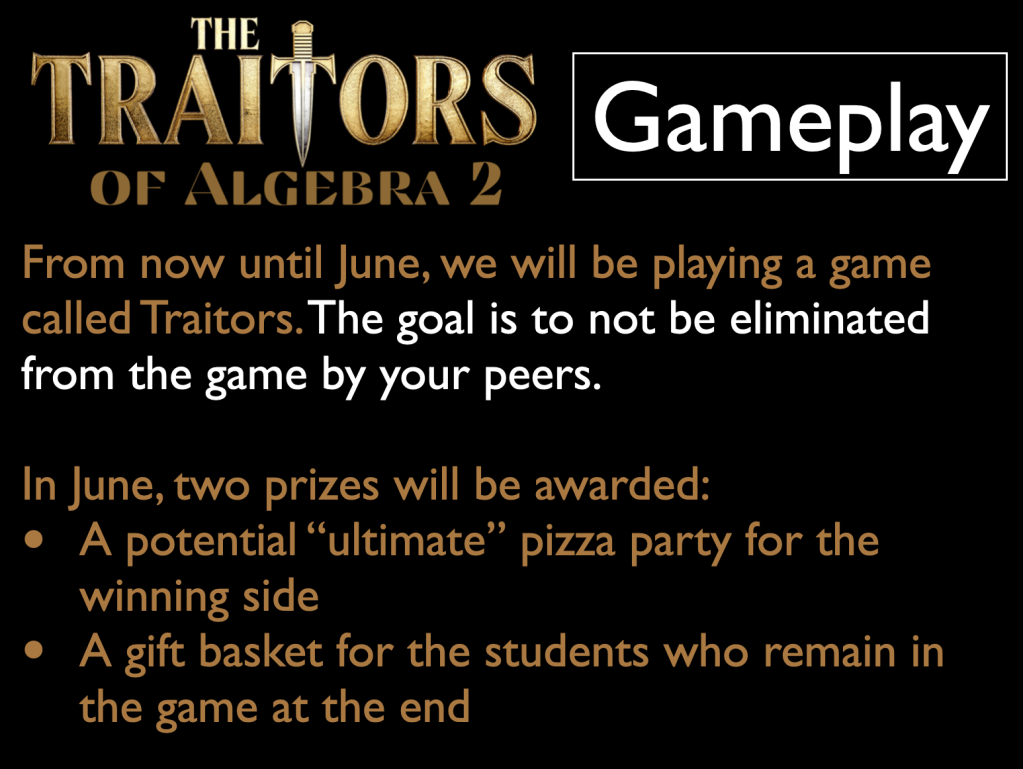I’m always looking for ways to foster community in my classroom. As a teacher, being close to my students and sharing unique experiences brings out the best in me. I only hope my students feel the same.
“Building community” can take many different forms, but for me, it often takes the form of a class tradition. When in-person learning resumed several years ago, I wrote about some classroom traditions that emerged (or reemerged) after remote learning, many of which have been staples in my teaching for years.
Many class traditions are short-lived by design. They appear out of nowhere, last for a year (or less), and are never heard of again. For example, one year, my fifth period students clapped for me when I walked into the room (I had a class right before them in a different room and always arrived just after the bell). Last year, fourth period hung Doritos bags in the classroom. We collected as many different varieties as we could find. (We even had one from The U.K.) Come to think of it, there have been so many of these pop-up traditions and rituals through the years…I really should do a better job of writing about them!
This year, another interesting tradition has found its way into my second period class. We call it Beverage Friday.
It started two months ago when I randomly asked a student in the class about a bottled drink they had with them, clearly purchased from a corner store. It was 11am and the drink was unopened. That seemed odd, so I asked why. The student told me that she had bought it for a friend and hadn’t given it to them yet. I remarked how kind she was.
“My friends don’t do that for me!” I said, half joking.
We started talking about how cool it would be if more people started buying each other drinks just because. We chatted for a few more minutes. Before I knew it, she volunteered to buy me a beverage. I politely asked that she not spend her money on me, but she insisted. I gave in. That was on a Tuesday. She vowed to give it to me on Friday.
Before I caved into her demands, my one condition upon accepting her gift was that her beverage had to be intentional. I requested that she not get me a drink randomly; she had to put thought behind it. I even encouraged her to do her “homework”: figure out what I liked and didn’t like. I wanted the drink to be representative of me rather than something that would simply quench my thirst.
When Friday came around, I was excited. Before class, I asked her if it would be okay if I announced our little pact to the class before she presented me with my drink. She loved the idea.
After our warm-up, I told the class all about our conversation, and then she revealed her beverage of choice to the class: a kiwi strawberry Snapple. A day before, she overheard me saying to another student how I didn’t like drinking soda. She also remembered me saying a few weeks earlier how I love fruit, especially strawberries. Thus, her choice of drink was a type of strawberry juice. The class erupted in applause.
Uplifted by her mini-presentation and the class’s reaction to it, I proposed that this turn into a weekly tradition. My pitch to the class was impulsive and on a limb, but why not indulge in such a tradition? It would be a fun, generous, and unique way to show appreciation to one another. Each week, the person who received a drink the week before would give a drink to someone else and present it to the class. And that person would do the same the following week. And on and on. The recipient of the drink remains unknown until Friday. And, just as with the drink I received, the beverages we gifted to one another couldn’t be random — they had to be given with purpose and thoughtfulness. The class was totally into the idea.
So far, five drinks have been exchanged, including one from me. Forgetfulness on behalf of the givers has caused recipients to not always get their drink on their assigned day, but overall the kids have been really into it. New traditions can be hard to get off the ground, but it seems like this will take us until the end of the year.
We’ve even found a neat way to help us chronicle our beverage-giving journey. When a recipient finishes their drink, we keep the bottle in the room. Our collection is growing!











